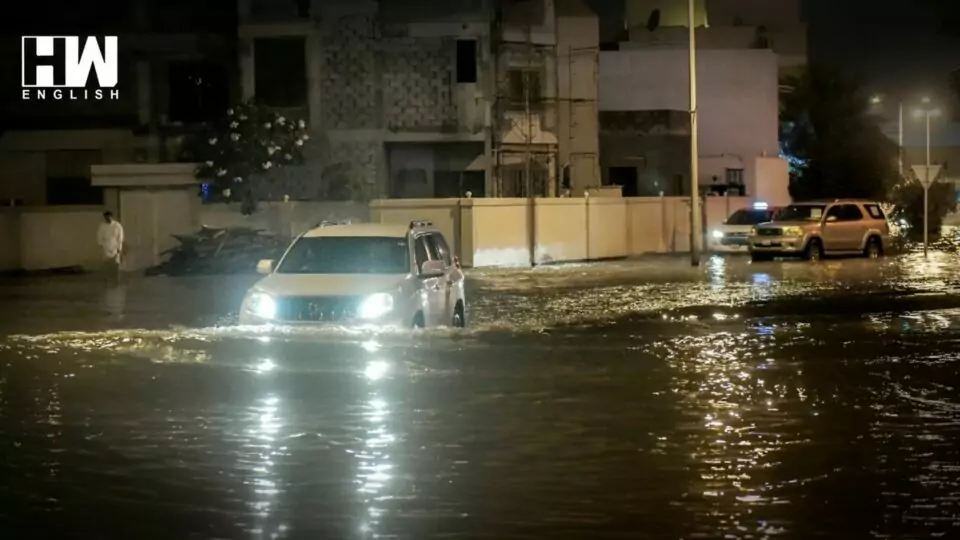The United Arab Emirates (UAE) has been hit by its worst rainfall in years, with the desert city of Dubai bearing the brunt of the deluge. In what the government has described as the most significant amount of rainfall in recent memory, the storms have caused widespread disruption, flooding significant highways and even temporarily shutting down the Dubai International Airport.
The heavy rains began on Monday night and continued into Tuesday, pouring down over 120mm (4.75 inches) of water in Dubai – the average amount the city receives typically annually. Some inland areas of the UAE recorded even higher totals, approaching 100mm (3.9 inches) in just 24 hours.
Absolutely disastrous rain in Dubai….!!!#DubaiStorm#DubaiFlooding#dubairains#تاجيل_المباراة pic.twitter.com/7vmRnYhHGZ
— Firdaus Fiza (@fizaiq) April 17, 2024
The sheer volume of water caught the authorities off-guard, as Dubai’s infrastructure, designed for an arid climate, largely lacks the drainage capabilities to handle such intense rainfall. Homes were flooded, vehicles abandoned on submerged roads, and authorities were forced to deploy tanker trucks to pump out the excess water.
The Dubai International Airport, a crucial global aviation hub, bore the brunt of the flooding. Videos circulating on social media showed the runway completely submerged, resembling an ocean rather than an airport. On Tuesday, flight operations were suspended for nearly 30 minutes as the deluge overwhelmed the facilities.
दुबई में तैरती फ्लाइट्स, एयरपोर्ट बना समंदर; बारिश ने किया जनजीवन तबाह! #dubairains #dubairain #DubaiFlooding pic.twitter.com/EpexYRbcrC
— Mohammad Altaf Ali (@MdAltafAli15) April 17, 2024
“Dubai received a year’s worth of rain in a day on Tuesday, which led to intense flash flooding across the city that submerged the runway at the Dubai International Airport, making it look like an ocean, while roads turned to rivers and homes were inundated,” reported one news outlet.
The airport, which typically sees around 88.9mm of rain annually, recorded almost 100mm in just 12 hours on Tuesday, totalling 160mm in the 24 hours. This unprecedented downpour led to the cancellation and delay of dozens of flights, affecting destinations across the region, including India, Pakistan, Saudi Arabia, and the United Kingdom.
Major airlines like Emirates and low-cost carrier Flydubai were forced to suspend or cancel multiple flights due to adverse weather conditions. In a statement, Emirates said, “multiple flights were delayed or cancelled due to the adverse weather.”
The UAE government had issued weather warnings before the storms, urging residents to stay home and venture out only in “extreme necessity.” Many heeded the call, with schools closed and government employees directed to work remotely until Wednesday.
The extreme rainfall was not limited to Dubai; neighbouring countries experienced heavy downpours and subsequent flooding. In Oman, at least 18 people, including 10 students, died in flash floods triggered by the intense storms. Bahrain also saw vehicles stranded on flooded roads.
Experts attribute this unprecedented deluge to a more significant storm system traversing the Arabian Peninsula and moving across the Gulf of Oman. The same system has brought unusually wet weather to southeastern Iran as well.
As the UAE and its neighbours grapple with the aftermath of the floods, questions are being raised about the resilience of their infrastructure to handle such extreme weather events. With climate change expected to increase the frequency and intensity of such storms, the authorities will need to re-evaluate their preparedness and invest in more robust drainage systems to mitigate the impact of future downpours.
The heavy rains that have brought Dubai to a standstill are a stark reminder of the challenges posed by the changing climate and the need for proactive measures to safeguard the region’s cities and communities.
As an independent media platform, we do not take advertisements from governments and corporate houses. It is you, our readers, who have supported us on our journey to do honest and unbiased journalism. Please contribute, so that we can continue to do the same in future.

